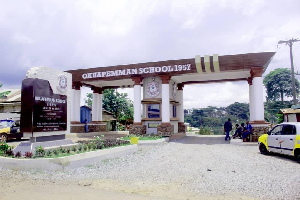- Home - News
- TWI News | TV
- Polls
- Year In Review
- News Archive
- Crime & Punishment
- Politics
- Regional
- Editorial
- Health
- Ghanaians Abroad
- Tabloid
- Africa
- Religion
- Election 2020
- Coronavirus
- News Videos | TV
- Photo Archives
- News Headlines
- Press Release
General News of Thursday, 27 September 2007
Source: GNA
Workshop to explore corruption in the water sector
Accra, Sept. 27, GNA - A two-day workshop to explore the issue of fighting corruption in water production, distribution and use in the West African sub-region opened in Accra on Wednesday with a call on citizens to help identify and eliminate the corrupt practices. Dr John Butterworth, Project Officer of International Water and Sanitation Centre (IRC), The Netherlands, said the fact that corruption in the water and sanitation industry within the West African sub-region had not yet become a topical issue did not mean that corruption did not exist.
Corruption, he noted, deprived about 1.25 billion people of access to drinking water, according to the United Nations World Water Development report 2006.
Dr Butterworth said indications from other developing countries especially in Asia had also shown that a large percentage of water sector finance was drained by corruption. Corruption hinders effective supply to the poor, who ended up paying more for water, which could even the contaminated, he told the about 50 participants from Ghana, Benin, Nigeria, Liberia and Sierra Leone.
"Beyond direct human suffering, corruption intensifies the world's regional water scarcities. It promotes the excessive withdrawal from surface and underground water sources, pollutes fresh water resources, encourages inefficient freshwater use and undermines environmental sustainability," Dr Butterworth said.
The workshop on the theme "Transparency and Accountability in Delivery of Water and Sanitation Services" is being organised by Ghana Integrity Initiative (GII), and Training, Research and Networking for Development (TREND) with support from Water Integrity Network, all NGOs. It aims at providing participants with the opportunity to identify the nature and ramification of corruption in the water sector in the sub-region, which has a large segment of its people not having access to potable water and sanitation facilities.
The workshop would also look at the strategic actions that could be pursued to address corruption if it did exist in the region. Professor Ken Agyeman Attafuah, Executive Director, Justice and Humans Institute, an NGO, said corruption in Ghana as elsewhere in the West African sub-region was endemic and permeated all sectors of the economy and state institutions.
"Bribing for public service is quite common in the business sector and illegal commissions are reportedly a way of life," he said and ruled out the fact that corruption could be absent in the water delivery sector.
Prof. Attafuah said the problem of corruption in the sub-region was compounded by lack of public confidence in the effectiveness of the national police institutions, which were the foremost anti-corruption agency in these countries.
He said the right to safe water imposed an obligation on the state to provide an enabling environment for access to water and to provide a non-negotiable minimum amount of safe, potable water for everyone regardless of economic or social status.
"The right to water is critically linked to the right to life, which also embraces the right to food and the right to a safe, clean and healthy environment."
Nana Kwasi Agyepong, Business Development Manager, GII said the organisation's vision was to make Ghana a corruption-free country in all spheres of human endeavours, where people and institutions would act with integrity, accountability and transparency. "Our mission is to continuously create awareness about the negative effect of corruption and to empower citizens to demand responsiveness, accountability and transparency from people and institutions in Ghana," he said. 27 Sept. 07










